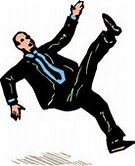by: Peter J. Gallagher (@pjsgallagher) (LinkedIn)

The facts and legal issues in sidewalk slip and fall cases sometimes read like they are pulled from law school final exams. In New Jersey, the baseline legal rule is clear — owners of commercial properties generally have a duty to maintain, in reasonably good condition, the sidewalks abutting their property, while owners of residential properties do not. But does a property owner have a duty to maintain its sidewalks when:
- the property is both residential and commercial, like a multi-family home where one unit is owner occupied and the others are rented (click here for more on that, but the short answer is that it depends on whether the property is primarily residential or primarily commercial ); or
- the plaintiff is a tenant and sues the landlord after slipping on a sidewalk outside the rental property (click here for more on that, but usually, yes); or
- the property is a commercial property, final judgment of foreclosure has been entered in favor of the lender, but no sheriff's sale has been scheduled (click here for more on that, but if the lender can be considered a mortgagee in possession, then yes); or
- the property is owned by a condominium or common-interest community (click here for more, but generally, yes if it's a private sidewalk within the condominium, no if it's a public sidewalk abutting the condominium); or
- the property is residential and the fall is caused by sweetgum spikey seed pods that fell from a tree on the defendant's property (click here, but, no).
And now one more can be added to the list thanks to the Appellate Division's decision is Ellis v. Hilton United Methodist Church, where the question presented was whether "sidewalk liability applies to an owner of a vacant church."
Under New Jersey law, churches are generally immune from liability for sidewalk slip-and-fall lawsuits because, "[w]hen a church [ ] uses its property solely for religious purposes[,] that use does not constitute a 'commercial' use." Thus church property, although not "residential" property, is generally treated like residential property for the purpose of sidewalk liability. But, if church property is used for commercial purposes, such as a private school charging tuition, then it is deemed commercial property regardless of the owner's non-profit status.
Under New Jersey law, vacant buildings can be considered commercial property for purposes of sidewalk liability. In 2012, the Appellate Division decided a case where a plaintiff was injured after slipping on a sidewalk abutting an abandoned, boarded-up building. The court held that, "despite being put to no use at all" at the time of the plaintiff's injury, the property was a "commercial building that had the capacity to generate income and had, in fact, generated income in the recent past."
Ellis combined both of these issues. Plaintiff slipped and fell on the sidewalk abutting property that had been used as a church until June 2011, but since then had been vacant. Plaintiff argued that defendant was subject to liability for his injuries because the property had the "potential to generate income" and therefore should be considered commercial property. There was no evidence that defendant had ever conducted, or allowed others to conduct, any commercial enterprises from the church. Instead, plaintiff argued that the property could have been, or presumably could be, put to income-generating use.
The court rejected plaintiff's argument, holding:
If we were to accept [plaintiff's argument], any noncommercial or residential property would be subject to sidewalk liability immediately upon it being vacated or abandoned because it had the potential to be converted to a commercial use. That result would go far beyond what [the New Jersey Supreme Court] contemplated when it carved out the exception to the rule against a landowner's liability and imposed it only on owners of commercial properties.
Ultimately, the Appellate Division ruled that "a vacant church maintains its status as a noncommercial property, not subject to commercial property's sidewalk liability." It went one step further, however, and addressed the vacant, non-church property issue, stating that it rejected "any reading of [New Jersey law] that imposes liability on owners of vacant residential or noncommercial properties that have not been put to any commercial use."